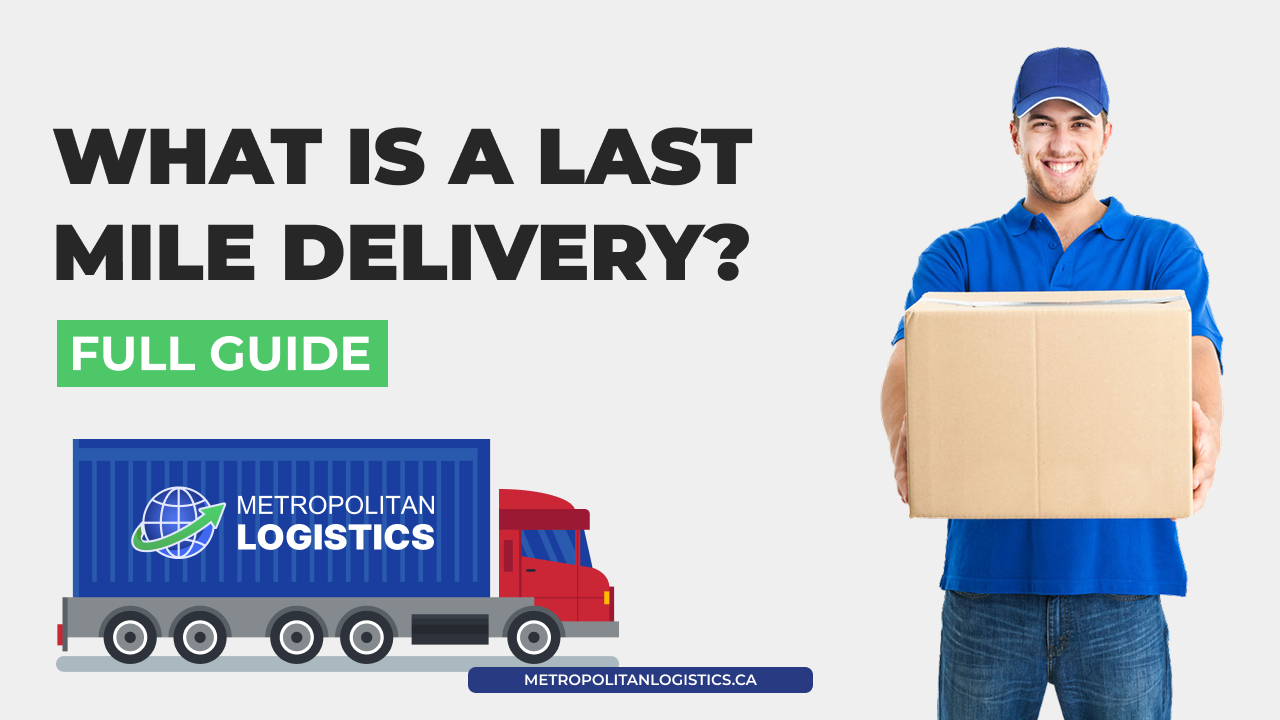
Learn what last mile delivery is, how it works, and why it’s crucial for eCommerce, logistics, and supply chains. Discover key challenges and smart solutions in Canada and beyond.
Last mile delivery refers to the final stage of the shipping process, when goods move from a transportation hub or warehouse to the customer’s doorstep. It’s called “last mile” because it represents the last leg of a long logistics journey — often the most complex and expensive one.
In Canada, last mile delivery plays a vital role in connecting national and international logistics networks with local customers. Whether it’s eCommerce parcels, furniture, or industrial shipments, this final segment defines how fast and reliable a company’s service feels to its customers.
Why the Last Mile Matters
The last mile directly affects customer satisfaction, delivery speed, and brand reputation. Even if global shipping and warehousing work flawlessly, a poor last-mile experience — like delays or lost packages — can ruin the customer’s impression.
Furthermore, last mile logistics account for nearly 53% of total shipping costs, making it the most expensive part of the journey. Companies now use technology, automation, and local hubs to minimize costs while maintaining high service quality.
How Last Mile Delivery Works
A typical last mile delivery process includes several key stages:
| Step | Description |
|---|---|
| 1. Order Received | The customer places an order online or through a retailer. |
| 2. Sorting & Dispatching | Goods are sorted at a regional warehouse or distribution center. |
| 3. Route Optimization | Delivery routes are planned using GPS and AI systems for efficiency. |
| 4. Out for Delivery | Drivers pick up the packages and start the delivery route. |
| 5. Proof of Delivery | The customer receives the shipment; confirmation is logged digitally. |
Each step requires coordination between technology, drivers, and customer support to ensure reliability and transparency.
Challenges in Last Mile Delivery
Despite its importance, last mile delivery faces several persistent challenges:
- High Costs: Fuel prices, driver wages, and vehicle maintenance make last mile operations expensive.
- Urban Congestion: Traffic in cities like Toronto or Vancouver slows deliveries and increases emissions.
- Customer Expectations: People expect real-time tracking and same-day delivery, putting pressure on logistics teams.
- Failed Deliveries: Missed delivery attempts cost companies both time and money.
Because of these challenges, logistics providers continually seek smarter, greener, and more flexible solutions.
Innovations Transforming Last Mile Logistics
Modern last mile delivery is being reshaped by technology and automation. Some of the most effective innovations include:
- AI-based route optimization: Reduces travel time and fuel usage.
- Electric delivery vehicles (EVs): Lower carbon emissions and operational costs.
- Smart lockers & pickup points: Allow customers to collect packages at convenient locations.
- Drones and autonomous delivery robots: Emerging tools for high-density urban zones.
- Real-time tracking systems: Give customers visibility and control over their deliveries.
For example, Canadian carriers are investing heavily in EV fleets and warehouse automation to improve sustainability while meeting strict urban delivery timelines.
Last Mile Delivery in Canada
Canada’s geography creates unique challenges for last mile delivery. Long distances between major cities and rural areas mean carriers must balance speed, cost, and reliability.
Urban centers like Toronto, Montreal, and Vancouver rely on dense delivery networks and micro-fulfillment centers to shorten routes. Meanwhile, smaller towns depend on regional partners and consolidated shipping strategies.
To bridge this gap, logistics companies such as Metropolitan Logistics provide integrated solutions — combining local trucking, warehousing, and real-time tracking to ensure smooth last-mile delivery nationwide.
Best Practices for Businesses
To succeed in the last mile, businesses should focus on:
- Route Optimization: Use AI and GPS to reduce delivery times and fuel usage.
- Transparent Communication: Offer tracking updates and estimated arrival times.
- Customer Feedback: Use reviews to identify pain points and improve service.
- Sustainability: Adopt electric vehicles and eco-friendly packaging.
- Strategic Partnerships: Work with professional logistics providers experienced in both local and international operations.
Why Choose Metropolitan Logistics for Last Mile Delivery
Metropolitan Logistics offers full-service last mile solutions across Canada, designed for importers, retailers, and eCommerce brands.
- Nationwide Network: From major cities to remote areas.
- Real-Time Tracking: Full visibility from warehouse to doorstep.
- Eco-Friendly Fleet: Electric and low-emission vehicles.
- Flexible Options: Home delivery, white-glove service, or B2B distribution.
Our expertise in container drayage, intermodal transport, and warehousing ensures seamless integration from port to final customer — all under one reliable provider.
📦 Learn more: Drayage & Intermodal Services in Canada
🚚 Explore Solutions: Freight Forwarding Canada
Conclusion
Last mile delivery is more than just the final step — it’s the moment of truth between a brand and its customer. Efficient, transparent, and sustainable last mile solutions are shaping the future of logistics, both in Canada and worldwide.
Whether you’re an importer, retailer, or eCommerce business, partnering with an experienced logistics company ensures your shipments arrive safely and on time — every time.